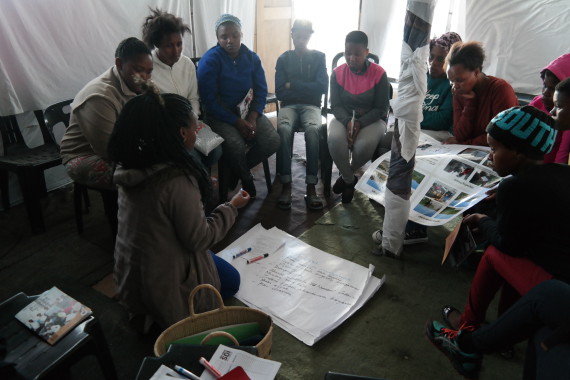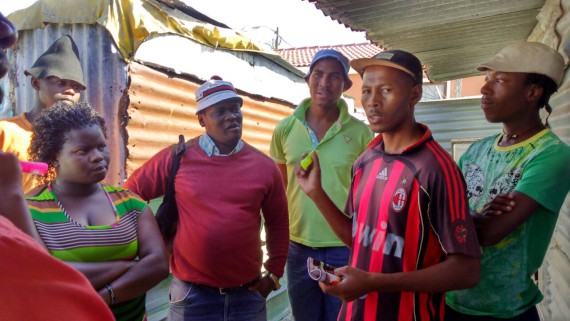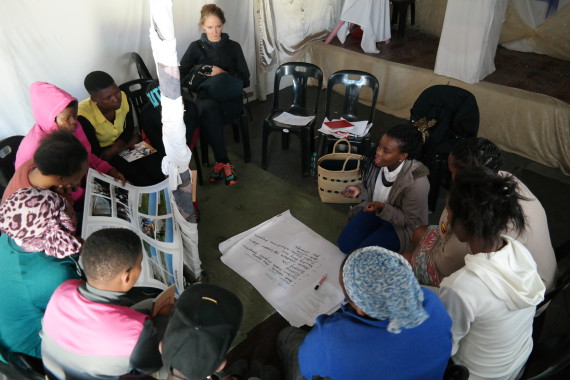By members of Bholobholo Informal Settlement (on behalf of ISN)*
For the SA SDI Alliance community-produced documentation is crucial. Engaging communities with such processes enables them to drive their own development interests and also positions them to share their experiences in community organization processes such as informal settlement upgrading. IN this way communities demonstrate the approach of the SA SDI Alliance: “Nothing for us without us”.
This blog was written by community members of Bholobholo, namely Nosipho Dzingwa,Masixole Siyaphi,Thabisa Kebe,Bulelwa Dunjwa, Thembela Spele,Nosiphathise Halile,Xolani Maqoko,Lulama Giyama,Zingiswa Tshwela and Mrs Duda.
History of the settlement
BholoBholo is located on a traffic circle intersection in Extension 6 in Mfuleni Cape Town. This is one of the smallest informal settlements in Cape Town with a land size of 912m².
We were backyarders in the surrounding formal houses. In 2006, we moved to an open space [which later became BholoBholo]. This was the time that plot owners were going to receive RDP houses. Since then we never moved back because the plot owners claimed that they did not have space for backyarders anymore. The church was built in 2007 and several more people joined as they saw an open space too. Some residents in BholoBholo bought shacks and joined the community in this way. To date we have 15 households with 33 people.
BholoBholo is an isiXhosa name for the intestine called ileum. The name came to the settlement because of the street vendors in front of the settlement that sell meat including intestines called uBholobholo. BholoBholo was an open space separating the meat vendors and the formal houses. This space was used for meetings and other activities such as a soccer field for kids.
Our reality now
Like any informal settlement, BholoBholo community is faced with a number of challenges which include:
- Electricity
The community of BholoBholo have used illegal connections for electricity, they pay a high amount to the nearest houses just to get their tap connected. These illegal connections are a danger to the kids that play in the area hence they might touch the wires and be shocked or worse, killed.
- Toilets and Taps
There are a total of four taps in BholoBholo of which two do not work properly. There is also a strong need for taps in the community because we share the ones we have with the meat vendors.We don’t have proper toilets, we make use of the bushes or ask to use the toilet in the formal houses.
- Multipurpose Hall and Park
We also need a hall to hold meetings and community events and a park for children to play in and be safe.
- Proper road access
“I wonder what would happen if our settlement could be in a fire? Who would we turn to?”
Masixole Siyaphi, Community leader in Bholobholo.
We need roads so that emergency vehicles can be able to assist us in time of need. Having roads/streets would make the place look neat and easy to find because now it takes longer to find a house number when needed.
Another major problem we are faced with is the dirt caused by the street vendors who use the dumping site to dump meat that they cannot sell. This causes an odor that can be a health hazard and attracts mosquitoes and rats that later bite the children.
How did we meet ISN?
Nkokheli Ncambele is the one who introduced us to the Informal Settlement Network (ISN) when ISN came to mobilise our settlement. We then attended meetings and learnt the rituals of the alliance. After that we started with the community organisation processes. Our settlement was enumerated by 2 members of the community which we selected ourselves. We also profiled the settlement together as the community. To date we are waiting for reblocking because we have completed the designs together with the CORC technical team. These plans are important to us because
“we want our children to have a place to call home and be safe”
Nosipho Dzingwa, BholoBholo community leader
*Blog compiled by Andiswa Meke (on behalf of CORC)




